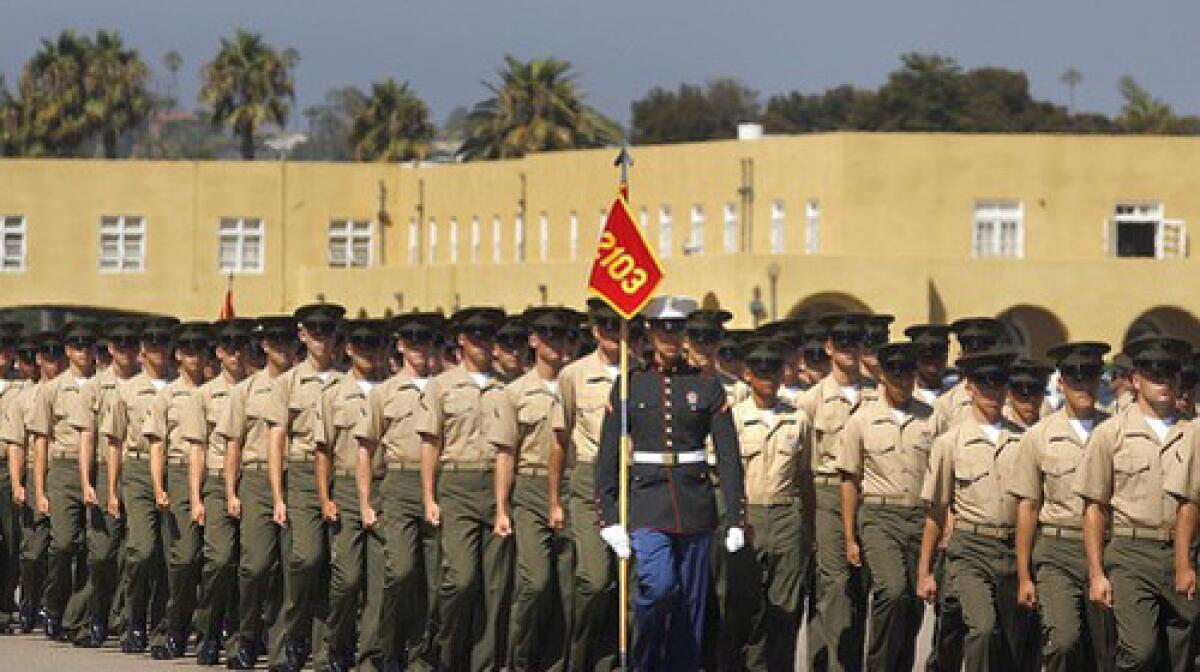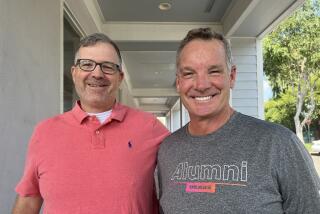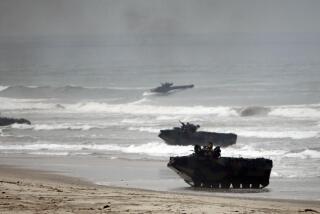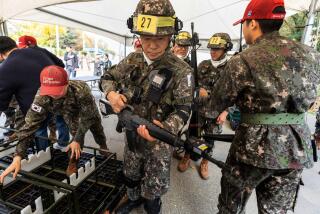From boys to Marines

One in a series of articles about three teenagers and their wartime enlistment in the Marines.
CAMP PENDLETON - A Marine recruit stumbled from the ranks and collapsed on a dirt trail. A corpsman, her medical bag bouncing in the dust, hustled over to the fallen man. The recruit was bathed in sweat, his face clammy and sickly green.
As the troop column marched on, the drill instructor cried out, “Here comes the silver bullet!”
The recruit was about to receive the ultimate indignity -- a shiny rectal thermometer to check his body temperature. It happened on the trail for all to see: Pants down. Buttocks bared.
The column kept moving.
It was the final day of the Crucible, a three-day ordeal in the harsh, scrubby foothills of Camp Pendleton. If a recruit survives the Crucible, the midpoint of the 13-week boot camp, he will likely survive to graduation.
Seven weeks earlier, three friends from Santa Clarita, just 110 miles north but a world away, arrived as eager recruits. Teenagers Daniel Motamedi, Daryl Crookston and Steven Dellinger signed up for the buddy program, which put them in the same boot camp platoon.
Now, the three friends -- their faces streaked with camouflage paint and grime -- were on the Crucible’s biggest physical challenge, a 10-mile hike called the Reaper. Recruits prefer to call it the “hump” or the “death march.”
Their uniforms gave off the sour stench of stale sweat. They had slept only a few hours over the previous two days, crammed into two-man tents. They had been allowed just three military Meals Ready to Eat.
Their thighs burned. Their spines ached under their 65-pound packs. Their M-16 rifles clanked against their sides. They gulped water from canteens as they struggled to stay in step. They screamed out on cue: “One shot, one kill! Ready to die, but never will!”
The three recruits, and 80 others in their platoon, had by now been hammered into obedience by omnipresent drill instructors. The friends had each been punished countless times for violations such as marching out of step or inattention to detail. They were forced to do dozens of push-ups, pull-ups or sit-ups. Drill instructors call it “incentive training.” Recruits call it “getting slayed.”
The friends had anticipated all that. They hadn’t anticipated getting sick.
Steven, 18, developed an ear infection and pneumonia. Daryl, 18, contracted flu and pinkeye. Daniel, 17, had pneumonia, followed by oral surgery to remove impacted wisdom teeth, then a nagging thigh bone injury. All three contracted upper respiratory infections, coughing and hacking along with others in their tight barracks warren.
“Recruit crud,” said their senior drill instructor, Staff Sgt. Nicholas Hibbs, with a shrug. “Everybody gets a little bit sick.”
The three resisted sick call. Too much sick time could get a recruit dropped.
The platoon’s BDR -- basic daily routine -- was unrelenting: Reveille and out of bed at 5 a.m. Ten minutes to stretch, wash up, fill canteens.
Every minute was prescribed: classes, exercises, drills, physical fitness. The recruits tore through each day, from day T-1 (introductory physical training) to day T-18 (confidence course). They endured day T-37, a gas chamber ordeal in which they inhaled tear gas.
They fired live ammo, fought with pugil sticks and bayonets, and learned Corps history, first aid, how to land blows and how to counter them. They rotated into fire watch. Every night, the recruits sang a verse of the Marines’ Hymn. For five minutes, they prayed. At 9 p.m., it was taps and lights out.
All this for $1,458 a month.
Most recruits in Platoon 2103, Echo Company, were away from home for the first time. They were stripped of TV, Internet, newspapers, books, magazines, radios, iPods, video games, cellphones, text messages, fast food and late-night refrigerator raids. Except for letters and a few brief phone calls, they had no contact with family or friends.
The platoon’s four drill instructors were a forbidding, inscrutable presence. The instructors told them how to eat, walk, shower, wash their clothes, hold their food trays and tie their boots. They never left the recruits alone. The instructors became outsized symbols of authority, knowledge, intimidation and fear.
Daniel, Daryl and Steven seemed to grasp, intuitively, the hard intentions of the drill instructors, and the rationale for their uncompromising demands.
“It sounds weird but, yeah, we have a lot of respect for our drill instructors,” Daniel said. “Once you realize everything has a purpose, it’s like, oh, OK, that actually makes sense.”
Hibbs found the three teens more mature than most.
“They know why they came, and they know what they’ve got to do,” he said.
Sgt. Lucas Tuning, 25, pounds practical instruction into recruits -- what the Corps calls “knowledge.”
Tuning took note of Daniel, but only because of his unusual surname, Motamedi. Tuning pronounced it “Multimedia.” The name stuck.
“He seems like he always has a lost look on his face,” Tuning said. “Maybe it’s just the way he processes information.”
Tuning said Steven too often has his mouth open. “I usually have to tell him to shut his lips. He smiled a couple times. That’s my pet peeve. If they’re smiling, they’re having too good a time.”
Daryl was harder to read because he was so quiet, Tuning said. “He picks up knowledge pretty good,” he said.
As the summer wore on, the recruits absorbed a peculiar vocabulary. The floor was the deck. The door was a hatch. The bed was a rack. A hat was a cover. The toilet was the head. Running shoes were go-fasters. A canteen was a water bowl.
They learned to snap to attention when drill instructors screamed “eyes!” (look at me) or “ears!” (listen up). They learned to refer to themselves in the third person, as in “this recruit.” It was one more way for the Corps to beat the individuality out of recruits in its pursuit of a selfless brotherhood.
The recruits heard about Iraq from the drill instructors, but only in a tactical sense -- fire teams, patrols, escorts. There was virtually no discussion of the merits of the war.
They found out that they could “request mast” -- report alleged abuse by drill instructors. But they also learned that they risked being branded an “allegator,” a recruit who makes repeated allegations. The three friends did not file any complaints.
Hibbs was asked whether he used behavior modification -- punishment for mistakes, rewards for accomplishments. “I wouldn’t say there’s too much reward,” he said.
A few minutes at ease
At the end of the fourth week, Daniel, Daryl and Steven were allowed to be interviewed. Inside the office of Capt. David Denial, the regiment operations officer, Daniel mentioned that he missed his family, which surprised him.
“I feel like I’ve gotten closer to my parents,” he said. “I know when I get back I really want to spend some time with them.”
His mother had written that she sometimes wished he were still a baby so that he’d be home. “Really embarrassing stuff,” he said.
Daryl said he realized now that he acted unfairly when he cut himself off from his parents because he believed they had tried to block his enlistment. His parents said they had merely wanted to ensure he knew what he was getting into.
“I’m sorry I took my family for granted,” Daryl said. “I was a problem child. I didn’t realize at the time that they were there for me.” Daryl’s mother, Kymmer Crookston, said her son had apologized.
As the friends spoke, they referred to one another as kids, or by their first names, rather than the required “recruit.” One of them called his rifle “a gun,” an unforgivable lapse. They neglected to address the journalists as “sir.”
Afterward, Denial blistered the recruits with a high-octane chewing out. They were a disgrace, he screamed. The dressing-down could be heard across the parade field, where recruits were drilling.
The three friends stood stiffly at attention, the captain’s florid face inches from theirs. He ordered them back to their squad bay, double time.
Denial explained later that it wasn’t what the recruits said. It was the fact that they lost all military bearing. That was inexcusable, he said.
The three bolted from the office to face their drill instructor.
Warrior spirit
The recruits were indoctrinated into the very ethos of what it meant to be a Marine. By implication, other military services, and certainly civilians, did not measure up to the Marine mystique. Recruits were required to live and breathe Honor, Courage, Commitment -- the values so ingrained that they seemed to exist only in capital letters.
At the same time, their weapons instruction began the process of molding trained, disciplined killers from cowed teenagers. Each recruit was taught ways to kill a man with his hands, his bayonet, his M-16.
One afternoon, during the fifth week, a Navy chaplain, Lt. Wayne Tomasek, addressed the platoon during a session called Values Training.
“You joined the Marine Corps because you wanted something bigger and greater than yourself!” Tomasek screamed at the recruits. “If you wanted to be average, you would have joined something else. You joined the elite organization of the United States Marine Corps!”
“Yes, sir!” the recruits responded.
The chaplain described what he called warrior spirit.
“When you go to combat, you may have some fears, and that’s OK,” he said. “But overcoming your fears, facing your fears, that’s what makes the warrior. You can no longer be a little boy. You have to act like a man.”
That same week, Hibbs gathered Platoon 2103 for a “foot locker” chat. “I’ll take the platoon away from the drill instructors just to get them relaxed and out of that atmosphere of somebody yelling at them,” Hibbs said.
The topic this day turned to the rules of war. Hibbs, who has served in Iraq, told the platoon that insurgents don’t comply with the rules that govern Marines’ behavior.
“If you’re a POW held by America, you’re not going to get tortured,” Hibbs said. “You’re going to get fed, get mail, all that stuff. You’re going to have rights.”
He did not mention detainee abuses at Abu Ghraib and elsewhere in Iraq and Afghanistan, and the recruits did not ask. Hibbs did advise them to do everything possible to avoid capture in Iraq.
“Say I run out of rounds. What am I going to do?” Hibbs asked.
The recruits, sitting in a circle around him on the squad bay floor, shouted: “Continue to fight, sir!”
Hibbs said, “Right! Slap my bayonet on! We’re going bayonet! I’m not letting you take me.”
A recruit asked why the media seemed to focus on bad news in Iraq and Afghanistan. “I think you mostly hear bad things on the news because nobody really wants us over there,” he told them. “It’s necessary that we’re there.”
Hibbs concluded by reminding the recruits to live and breathe honor, courage, commitment.
“You’ve got to feel it right here,” he said, pounding his chest. “That’s why they put that eagle, globe and anchor over your left breast pocket. It’s a feeling.”
‘This is all about heart’
At the Crucible two weeks later, Daniel was ordered to lead a medical evacuation drill in which three wounded men would be carried to a medevac helicopter landing zone.
He was given five minutes to assign duties. Within seconds, he made his first mistake. He did not issue direct orders. Worse, recruits offered suggestions.
“Why is someone else running your mission?” asked the drill instructor, Sgt. David Garza, 25.”No excuse, sir,” Daniel replied.
Garza singled out the platoon’s three heaviest recruits. “Bang, you’re dead,” he said. They were Daniel’s casualties.
Daniel tried to figure out how to lift the big recruits -- made bulkier by their flak jackets -- onto heavy boards used as stretchers. He hesitated as the recruits debated how to carry ammunition boxes that were part of the drill.
Garza, his voice dripping with sarcasm, told Daniel: “No rush. The casualties are just bleeding to death.”
Recruits hauled the three casualties a few yards, stumbled, then roughly dropped them. One casualty rolled off the stretcher and started to crawl back on.
Garza sputtered: “He’s a . . . casualty! He can’t move! Lift him back up on the . . . board!”
As the recruits bent to lift the casualty, their rifles were pointed at his head. Garza was apoplectic.
“Point your . . . muzzle AWAY from the casualty!” he screamed.
One recruit rested an ammo can on a casualty’s belly, prompting an anguished cry from Garza: “You just put an ammo can on a . . . wound!”
Finally, Daniel’s team lurched to the imaginary helicopter landing zone and delivered the wounded men.
Garza critiqued the mission, pointing out Daniel’s many mistakes but praising him for completing the mission and remembering to provide security.
“That was horrible,” Daniel said later.
Garza was charitable. “He did OK,” he said. Some tests are designed for failure, he said. “It’s to see how they deal with it -- to see if it wrecks their confidence or promotes creative decisions.”
The Crucible, Garza said, was “like forging metal with fire. You put them under pressure. They are either going to crack or they’re going to shine.”
The next day brought the Reaper, the hike up a mountainside in full combat gear. The recruits were given contradictory instructions: They were to leave no man behind, but they were not to assist a struggling recruit.
Daniel, Daryl and Steven grimly trudged uphill, their faces expressionless. They huffed and grunted, trailed by Garza’s screams: “Finish it! Finish it!”
Halfway up, a friend of Daniel’s faltered. Daniel told him to hang on to his pack, and he dragged his friend along. Both made it to the top, as did Steven and Daryl.
Like most platoons, 2103 was burdened with at least one weak, uninspired recruit. He was a slender, baby-faced boy who seemed resigned to his own limitations. He responded to the drill instructors’ screams with a barely perceptible mewing that enraged them.
Marching up the Reaper, the recruit stopped several times and bent over in pain. Finally, other recruits pushed, shoved and half-carried him to the top.
There, Garza gave a pep talk, citing the sacrifices of Marines who had earned the Medal of Honor. Each drill area on the Crucible is named after a medal winner and marked with a plaque honoring the Marine.
“Do you think he was tired? Do you think he was scared?” Garza asked after reading a citation for a Marine who earned a medal for heroism in Vietnam. The recruits replied wearily: “Yes, sir!”
“Just imagine how tired you are now,” Garza said. “But now you have to get to a firefight. You can’t stop just because of the pain. If that was the case, we would not win a lot of wars. . . .
“You’ve heard of mind over matter? You don’t mind, it don’t matter.”
Garza mentioned the laggard recruit, who sat staring at the dirt.
“I told you at the beginning this is all about heart,” he said. “And you had the heart to take him in. You carried his weight. That’s the only reason he’s here.”
The recruit was later dropped from boot camp for FTA -- failure to adapt.
Now the platoon headed down the mountain for the final five miles. Two recruits injured their ankles and had to be loaded onto a medical truck. A third collapsed from the heat and received the rectal thermometer. He, too, was loaded onto the truck.
When recruits faltered, Garza berated them, calling them “babies” and “quitters.” Daniel, Steven and Daryl slogged to the end and collapsed in soggy heaps in a base parking lot with the rest of the platoon.
As a reward, the platoon was allowed to shower for the first time in three days. In fresh uniforms, they were set loose at the mess hall for a “warriors’ breakfast.” They were allowed to eat all they wanted: eggs, steak, bacon, pancakes, waffles.
Predictably, several vomited afterward. “Sort of a tradition,” Garza said.
After breakfast, Daniel, Daryl and Steven were permitted to sit for interviews, their first since their disastrous experience weeks before, when they lost military bearing.
Now, as they answered questions, their manners were formal. They said “yes, sir” and “no, sir.” Each referred to himself as “this recruit.”
Daryl, a devout Mormon, said his religious faith had deepened under the rigors of camp. “This recruit feels the Lord really pulled him through,” he said. “This recruit was not really making good decisions before coming to boot camp. And boot camp was kind of the kick in the head that this recruit needed.”
Daniel spoke of a psychological journey from civilian to warrior. “I never showed it to anyone, but this recruit always questioned himself, you know? ‘Will I be able to pull through?’ ” he said. “So the Crucible gave this recruit a whole bunch of confidence. I don’t think I’ll ever doubt myself again.”
Steven considered boot camp a transforming experience. “This recruit believes he’s a little more disciplined and more respectful,” he said. “At first, this recruit was always talking and laughing, and got in trouble for it. This recruit finally realized that this recruit needs to settle down and actually do what the recruit is told, and not mess around.”
Back with their parents
On graduation day, hundreds of families squinted into the bright morning sun, trying to pick out their recruits. They all looked alike -- rigid, composed, trim and fit.
Mothers and fathers shouted out their sons’ names. A few family members wore T-shirts printed with messages: “My Marine Has Your Back” and “Some People Just Need Killing -- That’s Why We Have Marines.” Daniel’s sister, Setareh, 11, wore a cap with the message: “Proud sister of a U.S. Marine.”
A band pounded out the Marines’ Hymn, the 588 graduates from seven platoons marched in flawless step, and the Stars and Stripes rippled in the sea breeze.
Then came the climax of boot camp: the awarding of eagle, globe and anchor pins, a ceremony that christened the recruits as U.S. Marines.
“Wear it on your heart,” an officer told them as the Marine emblem was pinned to their uniforms. “Let it guide all your actions and intentions.”
Many of the mothers broke down in tears, and some of the fathers dabbed their eyes. A sergeant’s voice sounded: “Liberty will now commence! Dismissed!”
The formations collapsed. The recruits whooped and hollered. The families rushed out of the viewing stands. The three friends were swarmed by parents, siblings, grandparents and friends.
The mothers of Daniel, Daryl and Steven greeted their sons with the same words: “You look so handsome.”
The ceremony -- and the evolution of the three teenagers from high school kids to Marine men -- had a transforming effect on parents who had wanted their sons to attend college rather than enlist.
Ali and Yasmin Motamedi said they were proud of Daniel’s dedication to his country, and to the Corps. They were overwhelmed by the polite, focused, slimmed-down figure who stood before them.
“It’s like he’s a different person,” Yasmin said.
Daryl’s mother, Kymmer Crookston, had joined the Blue Star Mothers of America, a group of women with children in the military. The family car bore a new bumper sticker: “Proud Parents of a United States Marine.”
Kim Crookston smiled at his son and said, “We have a different son. What a drill instructor has done in three months -- I can say we’re grateful for the DI. Everything we’ve tried to do with Daryl is finally coming around.”
Steven’s mother, Cathy Carlson, also saw a more poised young man.
“He looks awesome -- very grown up,” she said. “I’m still very scared -- scared, but also extremely proud.”
The three friends will likely be sent to Iraq or Afghanistan at some point after joining an active-duty unit. First, they must complete two months of specialized infantry training at Camp Pendleton.
Steven’s father, Jim Dellinger, hoped his son would be sent to Afghanistan, but he knew Steven wanted to prove himself in Iraq. “It’s a scary thought,” he said, “but I know it’s what he wants to do.”
The three families were so caught up in the emotion of their reunions that they forgot about the Corps’ invitation to chat with the drill instructors in a receiving line that Marines call “the petting zoo.”
Hibbs was there. Platoon 2103 was his seventh. Daniel, Daryl and Steven typified the platoon, he said: bright and competent, not all-stars, but not problem children, either. Hibbs did notice one characteristic that set the three apart.
“I could tell right off they were good citizens, good people, good guys with good strong families, strong work ethics,” he said. “Honor, courage, commitment -- they already had it. It just has a new meaning to them now.”
More to Read
Start your day right
Sign up for Essential California for news, features and recommendations from the L.A. Times and beyond in your inbox six days a week.
You may occasionally receive promotional content from the Los Angeles Times.







